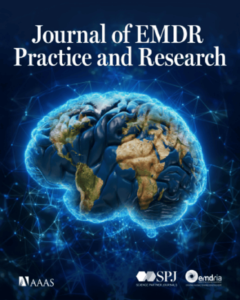Bioengineering an AI-augmented platform for remote mental health interventions (Results in Engineering)
This study developed and tested a new teletherapy system (a case management platform and a video-based therapy platform with support for remote EMDR) that uses artificial intelligence (AI) to improve remote psychological treatment and reduce therapists’ workload.
Read MoreUsability, feasibility, and preliminary outcomes of VR EMDR therapy for specific phobia: Mixed method study (Mental Health and Digital Technologies)
This study evaluates the feasibility, usability, and preliminary effectiveness of a VR based EMDR system for specific phobia treatment.
Read MoreFeasibility and Potential Efficacy of a Mobile App Series Based on Eye Movement Desensitization and Reprocessing: A Pilot Randomized Control Trial with Posttraumatic Stress Disorder and Comorbid Problems (Journal of EMDR Practice and Research)
This pilot study examined the feasibility, safety, and potential utility of 4 apps based on EMDR to help individuals manage symptoms of PTSD.
Read MoreEye movement desensitization and reprocessing (EMDR) for PTSD & trauma in XR using AI agents (TechRxiv)
This research contends that merging Eye Movement Desensitization and Reprocessing (EMDR) protocols with Extended Reality (XR) simulations and AI-driven adaptive feedback will substantially improve the accessibility, personalization, and efficacy of PTSD treatment.
Read MoreUnlocking the healing potential of internet psychotherapy: Harnessing artificial intelligence to enhance online EMDR therapy experience (IGI Global Scientific Publishing, 2025)
The chapter explores system development methodologies, design components, and the software development process essential for an Artificial Intelligence -based online EMDR therapy system.
Read MoreIndividual treatment selection for patients with post-traumatic stress disorder: External validation of a personalised advantage index (Psychotherapy Research)
This study explores the option of machine learning models to recommend types of PTSD treatment to patients based on potential individual differences, and highlights the need for external validation of machine learning models.
Read MoreEffects of rhythmic eye movements during a virtual reality exposure paradigm for spider-phobic patients (Psychology and Psychotherapy: Theory, Research and Practice)
Efficacy of a virtual reality exposure therapy (VRET) paradigm for phobic patients could be improved by adding rhythmic eye movements.
Read More



